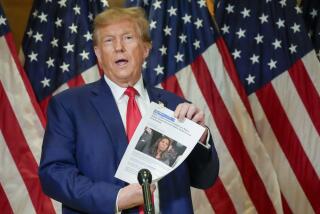Court Order Freezes All Assets Held by Marcos
- Share via
A Los Angeles federal judge on Friday froze all the assets in the estate of the late Philippine President Ferdinand E. Marcos until the completion of a lawsuit filed on behalf of 10,000 alleged Philippine torture victims and their families.
The freeze was imposed by U.S. District Judge Manuel L. Real in response to contentions that the assets--including at least $320 million in Swiss and Hong Kong bank accounts--might be spent by Marcos’ widow and children before the suit concludes.
Real imposed a preliminary injunction after holding a brief hearing by telephone conference call among lawyers in Honolulu, Los Angeles, Oklahoma City and Philadelphia. He extended a restraining order he had imposed in an emergency hearing last week.
Robert Swift, one of the plaintiffs’ attorneys, argued Friday that the freeze was needed because the Marcoses had an alleged pattern of using dummy corporations, phony foundations, pseudonyms and other schemes to move and conceal money not rightfully theirs.
Paul Hoffman, legal director of the American Civil Liberties Union of Southern California, who represents some of the plaintiffs in the case, said he was pleased by Real’s decision.
He stressed that Real’s order is not limited to the $320 million that former Philippine First Lady Imelda Marcos has acknowledged is part of Marcos’ estate. “If more assets are discovered, this order will apply to them,” Hoffman said.
Philippine officials have alleged that during his 20-year reign, Marcos and his wife looted the country of about $5 billion through a variety of sophisticated schemes. Last year, she was acquitted of criminal fraud charges by a federal jury in New York. Her husband died in September, 1989, before the criminal trial began.
Imelda Marcos returned to her native country from a nearly six-year exile in the United States this month. She has been indicted on tax evasion charges and faces charges on other alleged crimes, Philippine officials have said.
Real’s action came just 11 days after Marcos settled a huge civil fraud case in Los Angeles, where the Philippine government was seeking to recover billions that the Marcoses allegedly looted from their native country.
That settlement dissolved a worldwide freeze imposed on Marcos here by U.S. District Judge Mariana R. Pfaelzer in 1986. The government of the Philippines recovered about $50 million in that case.
Oklahoma City attorney Conner Helms, who represents the Marcos estate, argued in vain Friday that Real had no jurisdiction to act and that his order was unnecessary because Swiss courts have frozen the money there until the completion of the cases against Marcos in the Philippines.
Real is presiding over several cases in which Filipinos assert they or their family members were torture victims and are entitled to to damages under a 200-year-old law that enables foreigners to sue in this country.
The trial is scheduled to begin Feb. 18 in Honolulu. In order to prevail, the plaintiffs have to prove that they were tortured and show that Ferdinand Marcos was responsible for what happened to them, Hoffman said.
Attorney Ellen Lutz of Human Rights Watch, a public interest group, said that one of the witnesses in the trial will be Eugenio Mauricio, a former Philippine army colonel. She said Mauricio designed the martial law structure that Marcos put into effect in 1972 and used to perpetrate human rights abuses.
More to Read
Sign up for Essential California
The most important California stories and recommendations in your inbox every morning.
You may occasionally receive promotional content from the Los Angeles Times.












